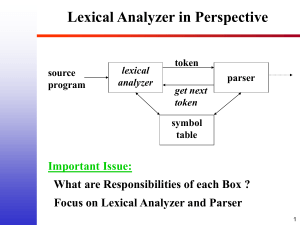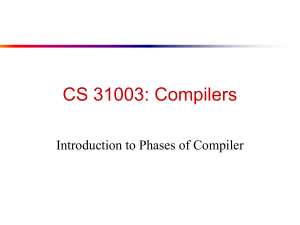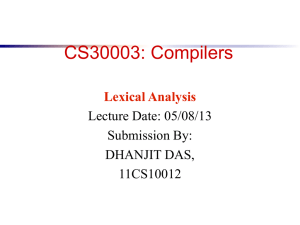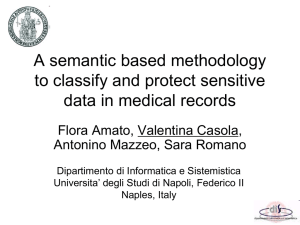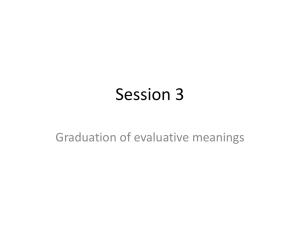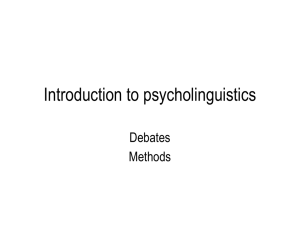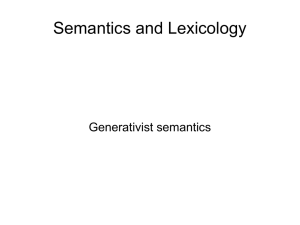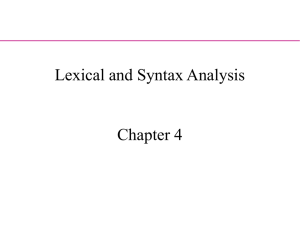CS 345 Dr. Mohamed Ramadan Saady Chapter 3: Lexical Analysis
advertisement
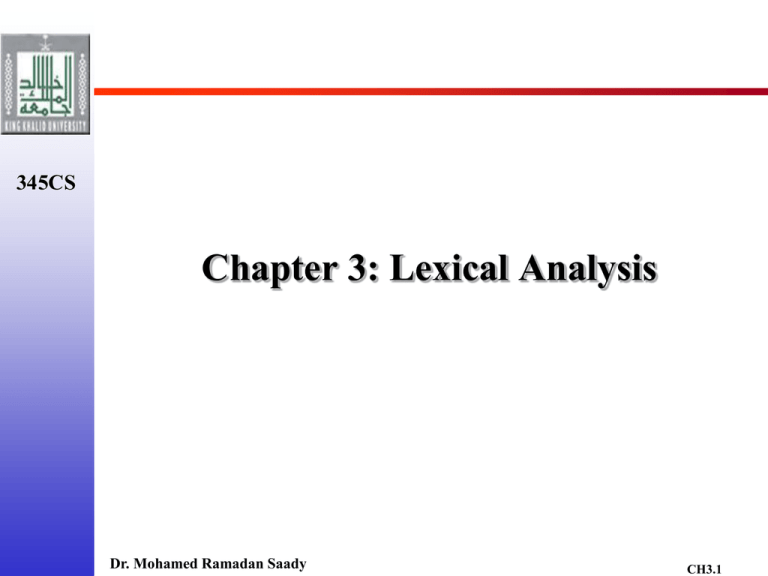
CS 345CS 345 Chapter 3: Lexical Analysis Dr. Mohamed Ramadan Saady CH3.1 Lexical Analysis CS 345 Basic Concepts & Regular Expressions What does a Lexical Analyzer do? How does it Work? Formalizing Token Definition & Recognition LEX - A Lexical Analyzer Generator (Defer) Reviewing Finite Automata Concepts Non-Deterministic and Deterministic FA Conversion Process Regular Expressions to NFA NFA to DFA Relating NFAs/DFAs /Conversion to Lexical Analysis Concluding Remarks /Looking Ahead Dr. Mohamed Ramadan Saady CH3.2 Lexical Analyzer in Perspective CS 345 source program lexical analyzer token parser get next token symbol table Important Issue: What are Responsibilities of each Box ? Focus on Lexical Analyzer and Parser Dr. Mohamed Ramadan Saady CH3.3 Lexical Analyzer in Perspective CS 345 LEXICAL ANALYZER Scan Input Remove WS, NL, … Identify Tokens Create Symbol Table Insert Tokens into ST Generate Errors Send Tokens to Parser PARSER Perform Syntax Analysis Actions Dictated by Token Order Update Symbol Table Entries Create Abstract Rep. of Source Dr. Mohamed Ramadan Saady Generate Errors And More…. (We’ll see later) CH3.4 What Factors Have Influenced the Functional Division of Labor ? CS 345 Separation of Lexical Analysis From Parsing Presents a Simpler Conceptual Model From a Software Engineering Perspective Division Emphasizes High Cohesion and Low Coupling Implies Well Specified Parallel Implementation Separation Increases Compiler Efficiency (I/O Techniques to Enhance Lexical Analysis) Separation Promotes Portability. This is critical today, when platforms (OSs and Hardware) are numerous and varied! Emergence of Platform Independence - Java Dr. Mohamed Ramadan Saady CH3.5 Introducing Basic Terminology What are Major Terms for Lexical Analysis? CS 345 TOKEN A classification for a common set of strings Examples Include <Identifier>, <number>, etc. PATTERN The rules which characterize the set of strings for a token Recall File and OS Wildcards ([A-Z]*.*) LEXEME Actual sequence of characters that matches pattern and is classified by a token Identifiers: x, count, name, etc… Dr. Mohamed Ramadan Saady CH3.6 Introducing Basic Terminology Token CS 345 Sample Lexemes Informal Description of Pattern const const const if if if relation <, <=, =, < >, >, >= < or <= or = or < > or >= or > id pi, count, D2 letter followed by letters and digits num 3.1416, 0, 6.02E23 any numeric constant literal “core dumped” any characters between “ and “ except “ Classifies Pattern Dr. Mohamed Ramadan Saady Actual values are critical. Info is : 1. Stored in symbol table 2. Returned to parser CH3.7 Handling Lexical Errors CS 345 Error Handling is very localized, with Respect to Input Source For example: whil ( x := 0 ) do generates no lexical errors in PASCAL In what Situations do Errors Occur? Prefix of remaining input doesn’t match any defined token Possible error recovery actions: Deleting or Inserting Input Characters Replacing or Transposing Characters Or, skip over to next separator to “ignore” problem Dr. Mohamed Ramadan Saady CH3.8 Designing efficient Lex Analyzers CS 345 is efficiency an issue? 3 Lexical Analyzer construction techniques how they address efficiency? : Lexical Analyzer Generator Hand-Code / High Level Language (I/O facilitated by the language) Hand-Code / Assembly Language (explicitly manage I/O). In Each Technique … Who handles efficiency ? How is it handled ? Dr. Mohamed Ramadan Saady CH3.9 I/O - Key For Successful Lexical Analysis CS 345 Character-at-a-time I/O Block / Buffered I/O Tradeoffs ? Block/Buffered I/O Utilize Block of memory Stage data from source to buffer block at a time Maintain two blocks - Why (Recall OS)? Asynchronous I/O - for 1 block While Lexical Analysis on 2nd block Block 1 When done, issue I/O Dr. Mohamed Ramadan Saady Block 2 ptr... Still Process token in 2nd block CH3.10 Algorithm: Buffered I/O with Sentinels Current token E CS 345 = M * eof C * * 2 eof lexeme beginning forward : = forward + 1 ; if forward is at eof then begin if forward at end of first half then begin reload second half ; Block I/O forward : = forward + 1 end else if forward at end of second half then begin reload first half ; Block I/O move forward to biginning of first half end else / * eof within buffer signifying end of input * / terminate lexical analysis 2nd eof no more input ! end Dr. Mohamed Ramadan Saady eof forward (scans ahead to find pattern match) Algorithm performs I/O’s. We can still have get & un getchar CH3.11
